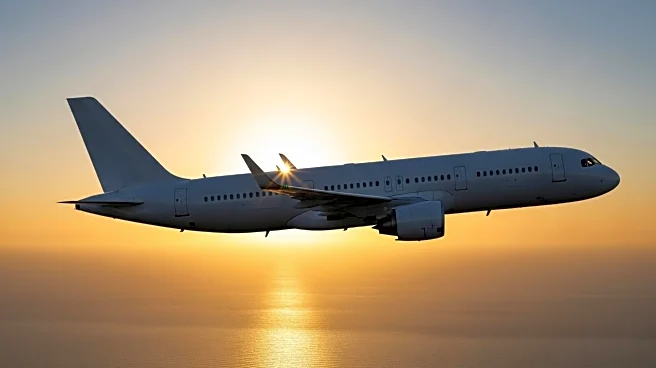What is the story about?
What's Happening?
United Airlines experienced an emergency situation on September 12 when a Boeing 737-800, en route to Cebu, was diverted to Osaka due to a cockpit warning indicating a potential fire in the cargo hold. The flight, carrying 135 passengers and seven crew members, landed safely at Kansai International Airport. Passengers evacuated the aircraft using slides, and two individuals were hospitalized with minor injuries sustained during the deplaning process. Despite the fire warning, initial inspections by maintenance revealed no evidence of an actual fire. The incident led to a temporary closure of runway 06R/24L at the airport. This event coincides with a recent Safety Alert for Operators issued by the Federal Aviation Administration, highlighting fire risks associated with lithium batteries stored in passenger compartments.
Why It's Important?
The diversion of United Airlines flight 32 underscores the ongoing safety concerns related to lithium batteries on aircraft. The FAA's alert emphasizes the potential hazards posed by personal electronic devices and spare batteries, which can act as ignition sources and start onboard fires. This incident highlights the need for airlines to review and possibly enhance their safety protocols regarding the storage and monitoring of lithium batteries. The hospitalization of passengers also raises questions about emergency evacuation procedures and passenger safety during such events. Airlines, regulators, and passengers alike must remain vigilant to prevent similar occurrences and ensure the safety of air travel.
What's Next?
Following this incident, United Airlines and other carriers may reassess their policies on lithium battery storage and handling. The FAA's alert could lead to stricter regulations or guidelines for passengers carrying electronic devices and spare batteries. Airlines might implement additional training for crew members to better manage potential fire risks and improve evacuation procedures. Furthermore, the aviation industry may see increased collaboration with battery manufacturers to develop safer technologies for air travel. Stakeholders, including airlines, regulatory bodies, and passengers, will likely engage in discussions to enhance safety measures and prevent future incidents.
Beyond the Headlines
The incident raises broader questions about the balance between technological convenience and safety in air travel. As personal electronic devices become more prevalent, airlines face the challenge of accommodating passengers' needs while ensuring safety. This situation may prompt discussions on the ethical responsibilities of airlines and manufacturers in mitigating risks associated with lithium batteries. Additionally, the event could influence public perception of air travel safety, potentially affecting consumer confidence and travel behavior. Long-term, the aviation industry may explore innovative solutions to address these safety concerns, such as developing fire-resistant materials or advanced monitoring systems.

















